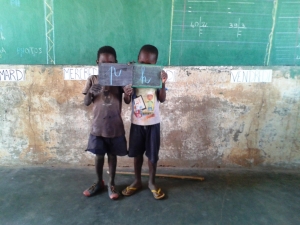Basic reading skills could result in a 12% cut in global poverty
A three year project “Improving Learning Outcomes in Early Grade Reading: Integration of Curriculum, Teaching, Learning Materials and Assessment”
(download the report in French below) across three West African countries: Burkina Faso, Senegal and Niger draws to a close on 31 January 2017.
Launched in 2013 by the International Bureau of Education (IBE-UNESCO), and sponsored by the
Global Partnership for Education (GPE), the project aimed to assist the three Ministries of Education (MoEs) to improve learning outcomes in reading and efficiencies of their basic education systems.
“To address today's global early reading education crisis, rather than focusing on access at school, it is vital that we focus on learning outcomes,” said Ms. Amapola Alama, who is in charge of the project at IBE-UNESCO. She continued, “The goal of our three year project has been to empower teachers to deliver effective early reading instruction by providing guidance, strategies and tools for improving the curriculum and the teaching practices.”
Key project milestones include:
- 2013. Three ministry officials from each of the three countries that have comparable educational and social realities were chosen to undertake the IBE-UNESCO diploma in curriculum run by the University of Tanzania;
- 2014. A diagnostic study resulted in a report “Teaching and learning of reading in a multilingual context: analyses, observations and recommendations for three sub-Saharan countries (Burkina Faso, Niger, Senegal)” (IBE-UNESCO) to inform action plans to implement effective reading instruction;
- 2015. As a result, a number of capacity building activities took place with IBE-UNESCO support in order to start the production of several curriculum documents including a national vision on reading, pedagogical guide, a tool kit, teacher training modules;
- 2016 to 2017. Capacity development workshops addressed to curriculum developers, teacher’ trainers, heads of school and teachers on how to improve teaching and learning to read and write were delivered in order to use the new curriculum documents produced since 2015. At the final wrap-up session in Burkina Faso from 17-19 January, IBE-UNESCO and the countries will present project implementation results and will reflect on how to guarantee their sustainability beyond the project life.
The $3 million project has drawn attention to the importance of quality education as a crucial condition for children to learn to read well in early years. It has also highlighted the correlation between the effectiveness of education systems and curriculum alignment with teaching materials, training and assessment.
In each country, those responsible for larger curriculum reforms (also involved in early reading curriculum reforms) have gained a better understanding of these two key factors for educational success. By underscoring the need for all units in each MoE to work in a coordinated way and ensure that everyone understands what is involved in teaching children to read, the project has laid the grounds for the development of education systems that consistently enable positive learning outcomes for all.
On a global scale, an estimated
250 million children who attend primary school in developing countries are struggling to read even basic words. Over the last two decades, national education policies and international aid for education have mainly focused on improving access to primary school and completion rates. Progress has been steady on these two indicators, but the focus now has to shift to ensuring that children who attend school actually learn. If all students in low-income countries left school with basic reading skills, 171 million people could be lifted out of poverty. This is equal to a 12% cut in global poverty (
GEM Report).
As well as the Ministries, IBE-UNESCO collaborated with partners such as
Agence Francaise de Developmment (AFD),
Organisation Internationale de la Francophonie (OIF), the
CONFEMEN and several universities: the
University of Geneva (Switzerland),
University of Sydney (Australia),
University of Koudougou (Burkina Faso),
University of Cheikh Anta Diop (Senegal) and University of Abdou Moumouni (Niger).
Further information:
Latest news in French from Burkina Faso (go to 15:45 of the video):
http://www.rtb.bf/2017/01/jt-de-20h-du-18-janvier-2017/http://www.ibe.unesco.org/en/activity/improving-reading-outcomes-early-years-primary-schoolhttp://www.ibe.unesco.org/en/news/ibe-unesco-present-its-reading-project-cies-2016
UNESCO: Education for All Global Monitoring Report:
http://unesdoc.unesco.org/images/0021/002193/219349E.pdf
Contact:
Amapola Alama, Program Specialist, IBE-UNESCO:
a.alama@unesco.org
